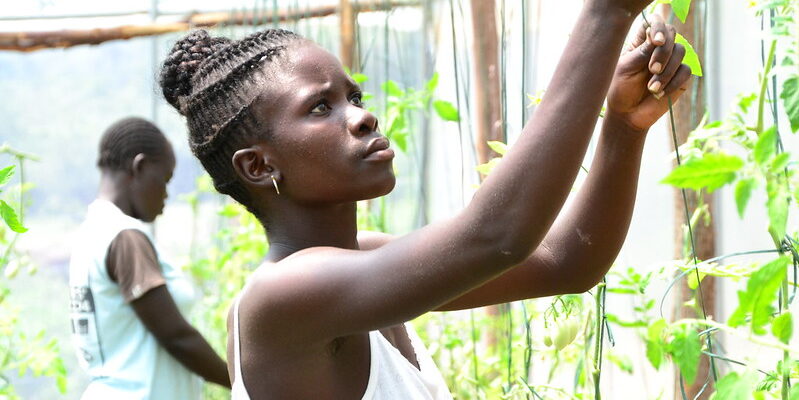Untapping the Ecological Potential of Africa’s Youth

By Kevin Muriithi Ndereba
African youth can be described as a sleeping giant.
70% of the African population are under the age of 30 years. According to the CIA World Factbook, Africa boasts the top 10 countries with the lowest median age. Niger’s median age is 14.8, and in Uganda, the second youngest, it’s 15.7. A report by the World Economic Forum claims that the youth population is projected to grow even further, as Africa's population is expected to reach 2.5 billion by 2050, up from 1.4 billion today.
Much of these statistical analyses have been proffered to respond to some of the socio-economic issues facing this dynamic continent. A missing theme in this discussion is the role of young people in ecological concerns, particularly, their agency within the diverse religious landscapes of Africa.
John Mbiti, the late religious scholar, was famous for observing that Africans are incurably religious. By this, he was seeking to offer a descriptive analysis of the undying presence and power of religions in Africa. Christianity, Islam as well as African traditional religions continue to offer lenses that guide the vision of Africans across ethno-cultural, regional and demographic perspectives. However, while the role of religion continues to be debated, both in its positive and negative contributions to society, there are growing demographics among young Africans who are identifying as non-religious. Be it as it may, religions provide a basis for engagement with Africa’s environmental issues, and even crises.
In early September, Kenya was privileged to host the Africa Climate Summit, which gathers multi-sectoral stakeholders to explore ways of reducing greenhouse gas emissions while adapting to the mounting fallout from the climate crisis. The Africa Youth Climate Assembly (AYCA) declaration and ambition statement is an illuminating response coming out of the conference, and speaks to the agency of young people in contributing to the continent’s green agenda. This is beautifully captured in their call to action:
[we] call upon African Union Heads of State and Governments, as well the international community, international organizations, the United Nations, civil society, the private sector, and other key decision-makers (hereafter ‘Key Stakeholders’) to commit to meaningful, inclusive, and systemic embedding of youth engagement in African climate change frameworks and process.
One of the key stakeholders are Christian religious communities that are very diverse. Churches in Africa are central places where young people congregate. The potential of the Christian tradition in responding to the climate change is not meagre. Key Christian religious thinkers of the environment such as Lynne White, Teilhard de Chardin, Ezra Chitando, Sofia Chirongoma and Madipoane Masenya, just to name a few, have broached the topic from exegetical, philosophical, historical and Afro-centric perspectives. What is gaping is an empirical approach that considers the voices of Africa’s youth in the conversation.
The initial research I’ve conducted in Kenya shows that young people have a capacity for nuanced interpretation of the role of the Christian religion in providing a basis for environmental engagement. This is seen in how African youth read sacred texts, noting their relevance for creation care. Young people view their role as environmental educationists in their diverse communities. Additionally, young people are keen in observing the roles of leadership and culture in either hindering or supporting progressive solutions in caring for creation, both in terms of the human and non-human aspects.
The role of youth movements in the socio-political liberation of African states, for instance in the anti-apartheid movements in South Africa and in the Arab spring of North African countries, are an example of how young people are advocates of social justice. Following the same line of thought, young people in the research view themselves as advocates of the environment i.e., climate justice advocates – with capacity to mobilize various actors for a variety of environmental campaigns. Finally, in light of the youth unemployment crises that threatens youth livelihoods, African youth see job-creation as well as social innovation opportunities as stemming the tide by safeguarding human dignity of the youth through environmental work.
What this reflection unearths is the restrictive silencing of youth voices, with particular reference to the climate crisis. This conversation unpacked the self-perceived agency of young Africans, and the key role of nurturing that institutions must develop. Moving beyond the negative stereotypes of young people as incapable, stubborn, unnecessary, this article focuses on the capacities, innovation and necessity that young people inhabit in the society.
My clarion call is to center the voices of those who color our present world and who will inhabit the world that we are currently shaping.
If governments, academies and religious institutions are concerned about the world of tomorrow, then my clarion call is to center the voices of those who color our present world and who will inhabit the world that we are currently shaping. Religious communities are not only concerned about ‘other-worldy’ visions, but have a critical role in shaping this present world – by curbing greed, capitalism, injustice and oppression, realities that contribute to the climate crises the world over. Retrieving youth voices and contribution is an asset for working towards a better world, for both human and non-human life.
Kevin Muriithi Ndereba is a Lecturer and Head of Department, Department of Practical Theology at St. Paul’s University, Kenya and Research Fellow in the Department of Practical Theology and Missiology, Stellenbosch University, South Africa. He participated in the "African Ecologies" writing workshop, hosted at the British Institute in Eastern Africa (BIEA), 29-31 July 2023 in collaboration with the Leeds University Centre for African Studies. This blog post is based on the paper he presented at the workshop and at the Africa Association for the Study of Religion (AASR) 2023 conference.
